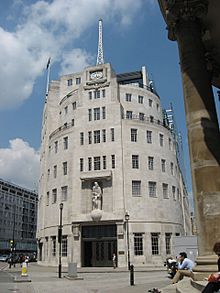BBC General Forces Programme facts for kids

The General Forces Programme headquarters was at Broadcasting House in London.
|
|
| Country | |
|---|---|
| Headquarters | Broadcasting House, London, England |
| Programming | |
| Language(s) | English |
| Ownership | |
| Owner | BBC |
| History | |
| Launch date | 27 February 1944 |
| Replaced | BBC Forces Programme |
| Closed | 31 December 1946 |
| Replaced by |
|
The BBC General Forces Programme was a special radio station in the United Kingdom during World War II. It broadcast from February 27, 1944, until December 31, 1946. This station was created to entertain and inform both British and American soldiers, as well as people back home during the war. It played a mix of music, comedy, news, and other shows.
History of the Programme
How it Started
When World War II began in September 1939, the BBC (British Broadcasting Corporation) changed its radio stations. They combined their two main channels, the National and Regional Programmes, into one new station called the BBC Home Service.
However, soldiers serving in the British Armed Forces needed more entertainment and lighter shows. So, in 1940, the BBC launched a new station just for them, called the BBC Forces Programme.
Later, in 1943 and 1944, many American soldiers arrived in Britain to prepare for important events like D-Day. These American soldiers were used to a different style of radio shows. To make sure everyone was happy, the BBC replaced the Forces Programme with the General Forces Programme. This new station also broadcast on shortwave radio to soldiers serving overseas.
What Was On Air
The first Forces Programme was made for soldiers who often had a lot of free time in their barracks. It offered a variety of shows, including dramas, comedies, popular music, quizzes, and other fun programmes. It also kept playing important news bulletins and informational talks.
But when American soldiers arrived, they found the British shows a bit slow compared to what they were used to back home. General Dwight Eisenhower, a very important American general, asked the BBC to make changes.
So, the BBC created the General Forces Programme. This new station offered a mix of shows that would appeal to both British and American listeners. It also aimed to entertain people on the "Home Front" – meaning people living in Britain who were supporting the war effort.
The General Forces Programme played many shows from American and Canadian radio networks. It also had popular British programmes, such as:
- Shipmates Ashore – a show for the Merchant Navy.
- Navy Mixture – another show for sailors.
- Forces' Favourites – a popular show where listeners could request songs. This show later became Family Favourites.
- War Office Calling the Army – a programme with news and information for soldiers.
- Strike a Home Note – for Scottish soldiers serving overseas.
- Welsh Half Hour – a programme for Welsh servicemen.
- SEAC – a newsletter for soldiers in the South-East Asian war zone.
- Hello GIs – a newsletter specifically for American soldiers in Britain.
- Mediterranean Merry-Go-Round – which included Stand Easy for the British Army.
- Much Binding in the Marsh – a comedy show for the Royal Air Force.
- HMS Waterlogged – a comedy show for the Royal Navy.
The General Forces Programme broadcast every day from 6:30 in the morning until 11:00 at night.
The End of the Programme
After Victory in Europe Day (VE Day) in May 1945, when the war in Europe ended, things started to change. The part of the General Forces Programme that broadcast on longwave radio in Britain became the BBC Light Programme on July 29, 1945.
The General Forces Programme continued to broadcast by shortwave radio to areas where fighting was still happening, especially in Asia. After Victory over Japan Day (VJ Day), it continued for soldiers who were occupying former enemy countries.
As British soldiers returned home and civilian life slowly went back to normal, there was less need for the General Forces Programme. It was gradually replaced by the Overseas Service in different areas. The General Forces Programme finally stopped broadcasting completely on December 31, 1946.
 | Stephanie Wilson |
 | Charles Bolden |
 | Ronald McNair |
 | Frederick D. Gregory |

